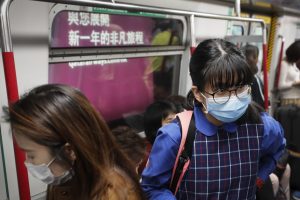Chinese President Xi Jinping said Monday that it’s “extremely crucial” to take every possible measure to combat a new coronavirus that has infected 217 people in the country.
His remarks, cited by state broadcaster CCTV, came the same day that the country reported a sharp rise in the number of people infected by the novel form of viral pneumonia, including the first cases in the capital.
The outbreak comes as the country enters its busiest travel period, when millions board trains and planes for the Lunar New Year holidays.
“The recent outbreak of novel coronavirus pneumonia in Wuhan and other places must be taken seriously,” Xi said, according to CCTV. “Party committees, governments, and relevant departments at all levels should put people’s lives and health first.”
They should “ensure that the masses have a quiet, peaceful and joyous Spring Festival,” he added.
Health authorities in the central city of Wuhan, where the viral pneumonia appears to have originated, said an additional 136 cases have been confirmed in the city, which now has a total of 198 infected patients. As of the weekend, a third patient had died.
Five individuals in Beijing and 14 in southern China’s Guangdong province have also been diagnosed with the new coronavirus, state broadcaster CCTV reported Monday evening. A total of seven suspected cases have been found in other parts of the country, including in Sichuan and Yunnan provinces in the southwest and in Shanghai.
The outbreak has put other countries on alert as millions of Chinese travel for Lunar New Year. Authorities in Thailand and in Japan have already identified at least three cases, all involving recent travel from China.
South Korea reported its first case Monday, when a 35-year-old Chinese woman from Wuhan tested positive for the new coronavirus one day after arriving at Seoul’s Incheon airport. The woman has been isolated at a state-run hospital in Incheon city, just west of Seoul, the Korea Centers for Disease Control and Prevention said in a statement.
At least a half-dozen countries in Asia and three U.S. airports have started screening incoming airline passengers from central China.
Videos posted online show people in protective suits checking one-by-one the temperatures of plane passengers arriving in Macao from Wuhan. A man surnamed Yang who works for the Macao Health Bureau confirmed over the phone that such checks are taking place in the southern Chinese region.
Many of the initial cases of the coronavirus were linked to a seafood market in Wuhan, which was closed as authorities investigated.
Since hundreds of people who came into close contact with diagnosed patients have not gotten sick, the municipal health commission maintains that the virus is not easily transmitted between humans. However, according to state media the head of the Chinese government expert team has just confirmed human-to-human transmission of the coronavirus, state media says.
China’s National Health Commission said experts have judged the current outbreak to be “preventable and controllable.”
“However, the source of the new type of coronavirus has not been found, we do not fully understand how the virus is transmitted, and changes in the virus still need to be closely monitored,” the commission said in a statement Sunday.
Coronaviruses cause diseases ranging from the common cold to SARS, or severe acute respiratory syndrome. SARS first infected people in southern China in late 2002 and spread to more than two dozen countries, killing nearly 800. The Chinese government initially tried to conceal the severity of the SARS epidemic, but its cover-up was exposed by a high-ranking physician.
“In the early days of SARS, reports were delayed and covered up,” said an editorial in the nationalistic Global Times. “That kind of thing must not happen again in China.”
“We have made great strides in medicine, social affairs management and public opinion since 2003,” the editorial said.
Xi instructed government departments Monday to promptly release information on the virus and deepen international cooperation.
China has notified and maintained close communication with the World Health Organization and other relevant countries and regions, Chinese Foreign Ministry spokesman Geng Shuang said at a regular news briefing.
Wuhan has also adopted measures to control the flow of people leaving the city, Geng said.
The virus causing the current outbreak is different from those previously identified, Chinese scientists said earlier this month. Initial symptoms of the novel coronavirus include fever, cough, tightness of the chest, and shortness of breath.
On the Weibo social media platform, which is widely used in China, people posted prevention advice such as wearing masks and washing hands. State broadcaster CCTV recommended staying warm, increasing physical activity, eating lightly and avoiding crowded places. Some people said they had canceled their travel plans and were staying home for Lunar New Year.
By Yanan Wang and Ken Moritsugu for The Associated Press. Associated Press researcher Yu Bing in Beijing and writer Hyung-jin Kim in Seoul, South Korea, contributed to this report.

































